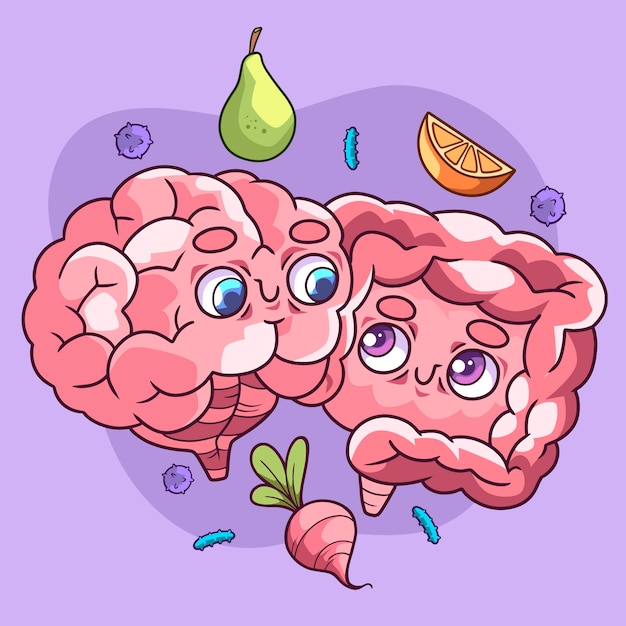Introduction:
The connection between our gut and brain, known as the gut-brain connection, is a remarkable and intricate system that plays a significant role in our overall health. This captivating network of communication and feedback between these two vital organs has gained considerable attention in recent years. In this blog, we will delve deeper into the fascinating world of the
gut-brain connection, exploring its various aspects and profound impacts on physical and mental well-being.
Understanding the Gut-Brain Connection:
The gut-brain connection refers to the bidirectional communication system between the gastrointestinal tract (the gut) and the central nervous system (the brain). This intricate connection involves a complex network of nerves, hormones, and biochemical signaling pathways. Two key players in this connection are the enteric nervous system (ENS) and the
vagus nerve.
Key Aspects of the Gut-Brain Connection:
Enteric Nervous System (ENS):
- Often referred to as the “second brain,” the ENS is a complex network of neurons that spans the gut. It can operate independently of the central nervous system, controlling various gastrointestinal functions. However, it also communicates with the brain through the vagus nerve, sending signals that influence digestion, nutrient absorption, gut motility, and even emotions.
Neurotransmitters and Hormones: - The gut produces a wide array of neurotransmitters and hormones that profoundly impact brain function and mood regulation. For instance, serotonin, a neurotransmitter associated with mood and well-being, is predominantly produced in the gut. Surprisingly, around 95% of the body’s serotonin is found in the intestines, not the brain. Other neurotransmitters such as dopamine and gamma-aminobutyric acid (GABA) also play crucial roles in the gut-brain communication, affecting mood, emotions, and cognitive processes.
Microbiota and the Gut-Brain Axis: - The gut is home to trillions of microorganisms collectively known as the gut microbiota. Research has revealed that these microorganisms not only contribute to digestion but also influence the gut-brain connection. The gut microbiota produces various metabolites, including short-chain fatty acids and neurotransmitters, which can directly impact brain health and function. Furthermore, the gut microbiota communicates with the brain through the gut-brain axis, a bidirectional signaling pathway, influencing mood, behavior, and cognitive processes.
Impacts on Physical and Mental Health:
Digestive Disorders and Mental Health:
- Disruptions in the gut-brain connection have been associated with various digestive disorders, including irritable bowel syndrome (IBS), inflammatory bowel disease (IBD), and gastroesophageal reflux disease (GERD). Remarkably, these conditions often coincide with an increased risk of mental health disorders such as anxiety and depression. Understanding the interplay between the gut and brain becomes crucial in comprehending and managing these conditions effectively.
Mood and Emotional Well-being: - The gut-brain connection significantly influences our mood and emotional well-being. The production of neurotransmitters in the gut, including serotonin, dopamine, and GABA, directly affects our emotions. Imbalances in the gut microbiota or disruptions in neurotransmitter production can contribute to mood disorders such as anxiety and depression. By nurturing a healthy gut-brain connection, we can positively impact our emotional state and overall well – being.
Cognitive Function: - The gut-brain connection also exerts a profound influence on cognitive function. Research has demonstrated that alterations in gut microbiota composition can affect cognitive performance, including memory, attention, and concentration. Additionally, conditions like leaky gut syndrome, where the integrity of the intestinal lining is compromised, can result in the leakage of toxins into the bloodstream, potentially impairing brain function. Maintaining a healthy gut-brain connection becomes paramount for preserving optimal cognitive abilities.
Nurturing a Healthy Gut-Brain Connection:
Diet and Nutrition: - A balanced and nutritious diet is key to supporting a healthy gut-brain connection. Incorporate fibre-rich fruits, vegetables, whole grains, and fermented foods into your meals. These dietary choices promote a diverse and thriving gut microbiota, positively influencing the gut-brain axis.
Stress Management:
- Chronic stress can disrupt the delicate balance of the gut-brain connection. Engaging in stress-reducing activities such as regular exercise, meditation, deep breathing, and ensuring adequate sleep can help maintain a healthy connection between the gut and brain.
Probiotics and Prebiotics: - Probiotics are beneficial bacteria that can enhance the composition of the gut microbiota. Consuming probiotic-rich foods like yogurt, kefir, and sauerkraut or taking probiotic supplements can contribute to a healthier gut microbiota. Prebiotics, on the other hand, are dietary fibers that serve as nourishment for beneficial gut bacteria. Including prebiotic-rich foods like onions, garlic, bananas, and whole grains can support the growth of beneficial gut microbiota.
Conclusion:
The gut-brain connection is a captivating field of study that highlights the profound interplay between our gut and brain. Understanding and nurturing this connection through a balanced diet, stress management, and gut-friendly practices can positively impact both our physical and mental well-being. Prioritizing the health of our gut-brain connection allows us to harness its potential and optimize our overall health and quality of life.




